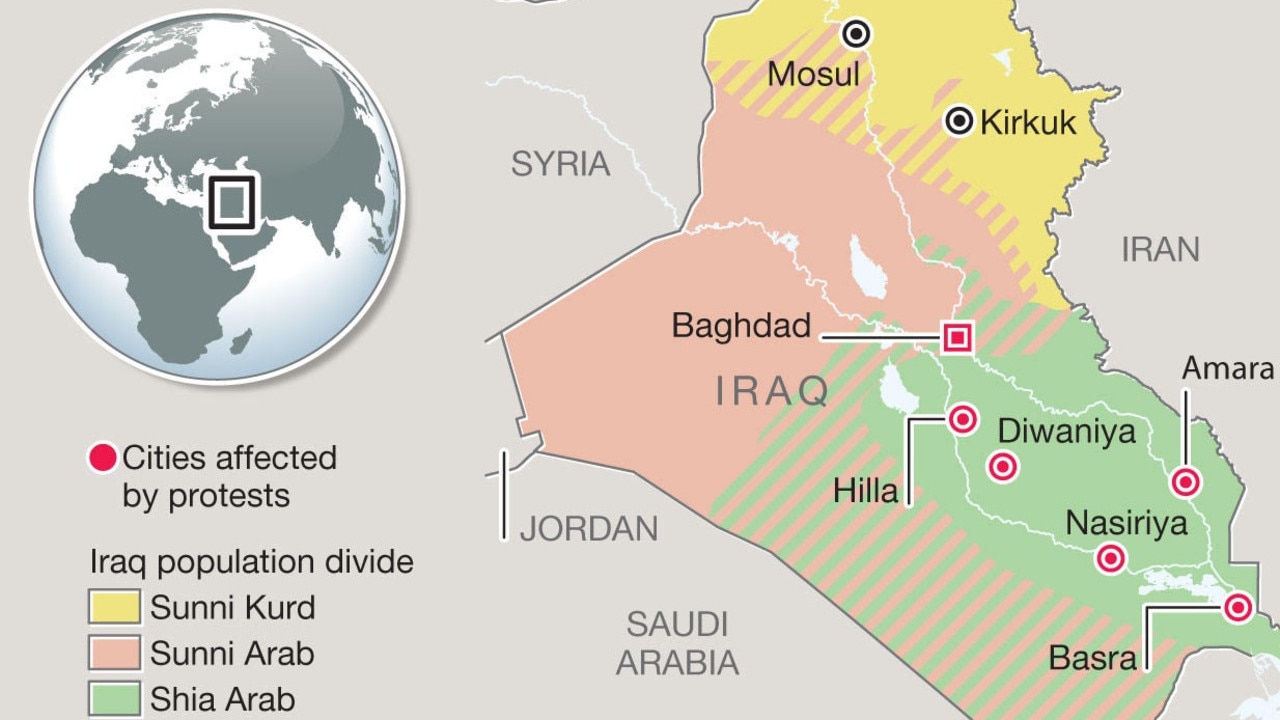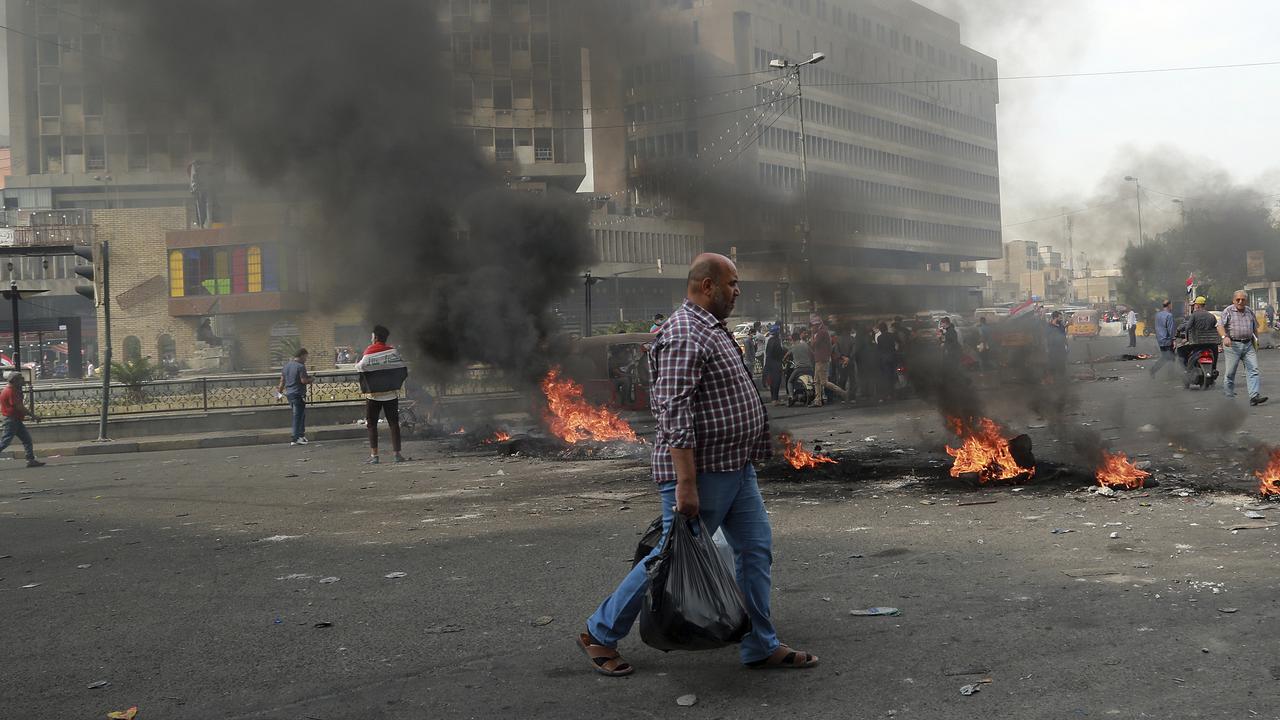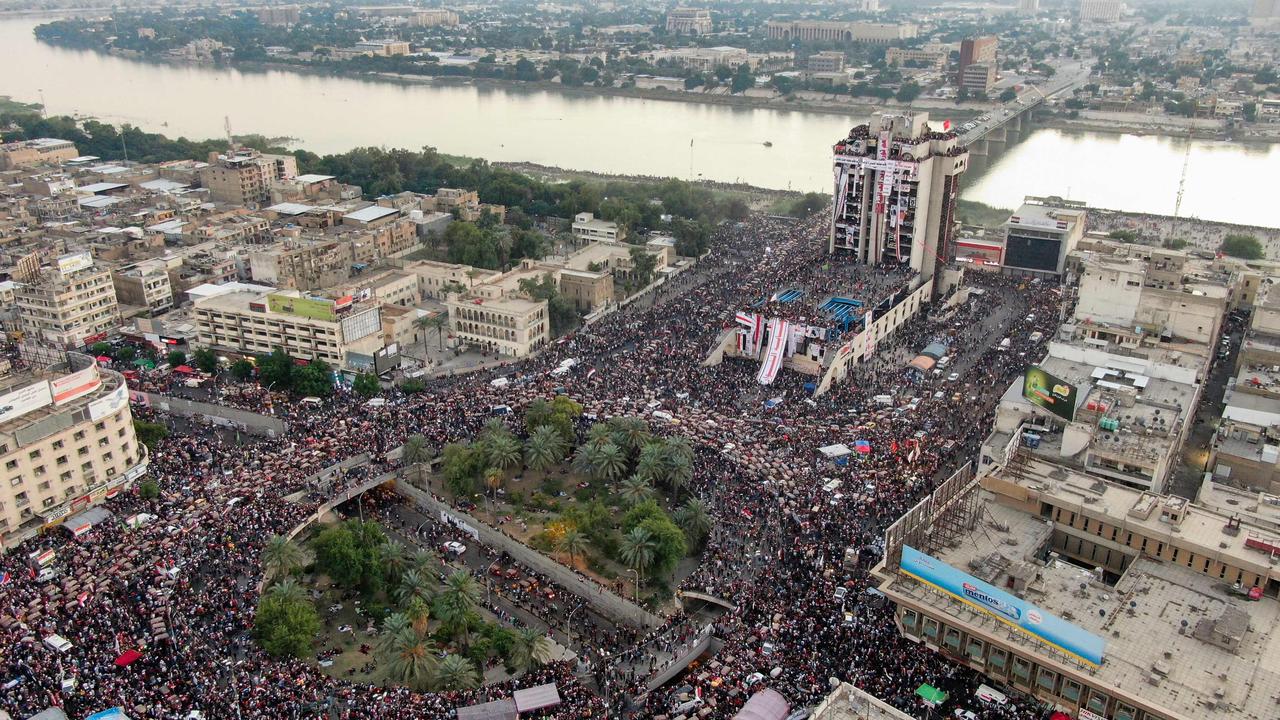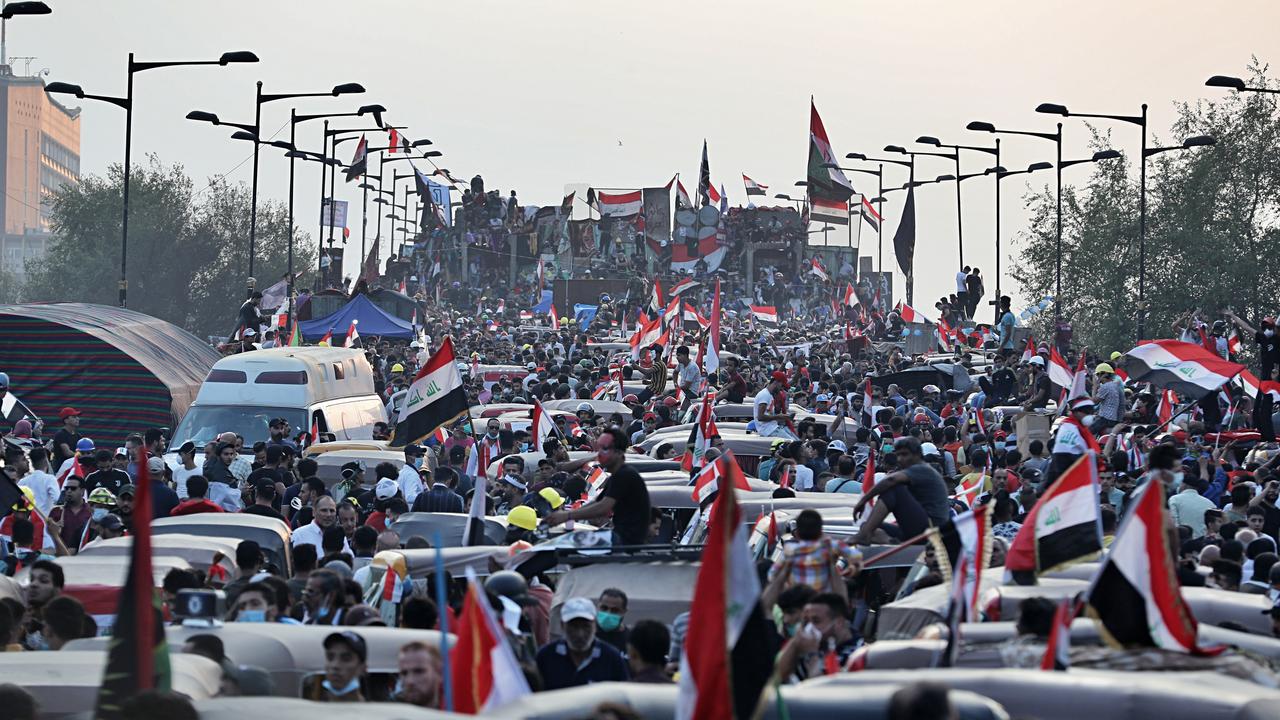The ominous sign for Iraq as it spirals towards revolution
It’s suffered two invasions and a mission to save it from the Islamic State. Now this nation caught between the world’s fiercest enemies is on the brink of spiralling out of control.
At least three people have been reportedly shot dead at protests outside the Iranian consulate in Iraq this weekend, as the country is engulfed in widespread unrest over corruption, unemployment and public services.
Despite the $US220 billion reconstruction effort following the US-led 2003 invasion, Iraq remains suffering from immense unemployment, failing public services and widespread corruption.
Over the weekend protesters threw burning objects over the walls around the Iranian consulate in protest over perceived interference in internal affairs.
It comes amid widespread unrest where tens of thousands have taken to the streets to call for regime change and the end of corrupt parties. And that’s before you take religious divides into account.
During the weekend’s protests, Iraqi security forces opened fire with tear gas and live ammunition to disperse tens of thousands of demonstrators swarming through the streets of Baghdad. More than 250 people have been killed amid a security crackdown in the past month.
Among them are anti-corruption activists and disaffected Shiite and Sunni factions. But there are also competing Iranian and Saudi agents seeking to influence the future of the once-powerful Middle Eastern nation.
International affairs analysts are fearful: Is Iraq on the path to becoming another Syria? Are regional competitors destroying the dysfunctional government in their play for power?
“Iraq shows all too many signs of returning to the kind of internal instability that led to low-level civil war in 2011 and the rise of (Islamic State),” says Centre for Strategic and International Studies analyst Anthony Cordesman, “and that undercuts any efforts to bring stability and defeat extremism”.


A LOOTED LAND
The divided nation’s constitution attempts to balance power between competing Shiite factions as well as minority Sunni and Kurdish groups. As a result, religious parties – many backed by Iran and Saudi Arabia – dominate the government.
But Iraqi citizens are angry with the rampant nepotism and corruption this has produced.
They’re angry that more than 15 years after the US invasion, they’re still suffering regular power cuts, polluted water supplies, crumbling infrastructure and rampant unemployment. They see little benefit from the wealth generated by their nation’s oil reserves.
“Outside experts still rate Iraq as having one of the worst governments in the world,” says Mr Cordesman. “Its governance rankings are again consistently dismal, and it is clear that this is as true of governance at the local level as well as the national level.”
Iraq’s President Barham Salih agrees extensive electoral law reform is needed, adding he would call a general election as soon as this is passed. A draft bill is due to be submitted to parliament this week.
“Strengthening and depoliticising Iraqi institutions – such as the army, police, judiciary, and local administrations – will be vital,” says Brookings Institution analyst Vanda Felbab-Brown. “But that is an unlikely near-term prospect.”
The Iraqi people also remain unconvinced.

Protesters have been targeting the government and privileged elites by blocking major roads and essential supply lines. Bundles of barbed wire and burning tyres surrounded one roadblock under a banner declaring: “Roads closed by order of the people”.
Prime Minister Adel Abdul-Mahdi was at the weekend stung into a call for factories, schools, stores and universities to reopen, adding the roadblocks were costing the country “billions” of dollars in lost export revenues.
It’s also a major international embarrassment.
Since October 25, there have been ongoing clashes around two bridges leading into Baghdad’s heavily fortified Green Zone, a hangover from the early days of the US occupation of Iraq. Here, international diplomats, government officials and business executives seek refuge from the turmoil surrounding them.
Last week, a volley of rockets fell inside the compound. The US blamed Iran-backed Shiite militias.

UNWILLING ALLIES
Shiite and Sunni Islamic factions have been at each other’s throats for centuries. Iran is a Shiite state. Saudi Arabia is a Sunni state. Iraq is torn between the two, though its population is predominantly Shiite. Which is why Iran has such a strong influence within Iraq.
Iranian-backed Shiite militias joined the US-led international Coalition against Islamic State in Syria and Iraq. Now, their fighters have emerged from that war empowered and emboldened, ready to battle for their own agendas.
“These groups, which played a key role in defeating the Islamic State in Iraq, now pose their own challenges to the Iraqi state and society,” Ms Felbab-Brown says.
“They have deeply permeated the state and its still-developing political institutions.”
Now, Iran wants the US out of Iraq.
The US, for its part, is increasingly hostile towards Tehran after a series of attacks on tankers and oil facilities in the Persian Gulf.
“With tensions running high between the United States and Iran on the one hand and Iran and Saudi Arabia on the other, (that) further severely complicate efforts to curtail the influence of the Hashd (militias),” Ms Felbab-Brown adds.
That leaves Iraq torn between three powers on the brink of conflict. On one side is a multitude of Iranian-backed Shiite militias. On another is the US-trained and supplied government military. And then there is the disaffected Sunni minority backed by Saudi Arabia.
All three could soon become proxy soldiers in a chaotic shadow war.
But there’s a fourth complication sitting in the wings.
CALIPHATE IN WAITING?
Half a million former Islamic State (IS) subjects remain in detention centres throughout Iraq. These are not the caliphate’s commanders, hard-core foreign fighters or preachers. They are the men, women and children that made up the insurgent religious state.
The fate of this mostly Sunni population is yet to be determined. Will they be put on trial? Or set free?
Either way, Iraq knows the longer they remain detained, the higher the chance of another uprising.And Iraq is in no position to counter any second attempt to establish an IS caliphate. Just 10,000 have been allowed back to their homes since August.
Mr Cordesman says the Iraqi government has been ineffective in dealing with the fallout of IS.
“It is not healing the deep divisions between Sunni and Shi’ite or the tensions between Arab and Kurd, and there is no emerging unity among the Sunni, Shi’ite and Kurdish factions,” he writes.
“Put bluntly, defeating IS, working out more sectarian and ethnic compromises, and other efforts to rearrange Iraq’s deck chairs while the nation continues to sink, is not going to stop terrorism, limit Iran’s influence or give Iraq the internal strength, unity, and progress needed to help stabilise the region and the world’s key source of oil exports.”
Iraq’s parliament remains split between those who want to reintegrate those populations torn apart by war and those who simply want them to go away.
“You showed us the way in Guantánamo Bay,” one Iraqi presidential adviser reportedly told Foreign Affairs. “Why should we be different?”
But the 500,000 “IS families” are just part of the 1.5 million people – mainly Sunnis – displaced within Iraq by the brutal war with IS. Most live in desert camps with minimal government support. They fled without identity papers, so they’re not allowed to move or work.
“What hope do we have? Are we supposed to stay here forever?” one detained man, a Sunni, asks.



